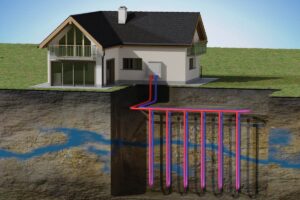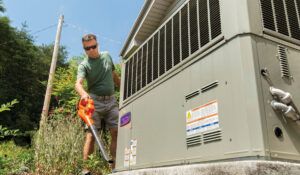Earth Day is April 22, a time when we celebrate the planet we are lucky to call home. During this day of appreciation, I encourage you to take action at home by making changes to conserve energy. If we all contribute, even small adjustments and changes to how much energy we use can have positive impacts.
Electricity is essential to our daily lives. It gives us opportunities to learn, keeps us safe and comfortable and provides entertainment. The downside is that every source of energy generation has consequences. Fossil fuels emit carbon. Hydropower dams limit the passage of migrating fish. Even solar panels can’t be made without mining minerals. Using less electricity is a way to mitigate the impact of producing the electricity that powers our lives.
Before diving into ways to use less energy, it’s important to know the difference between conservation and energy efficiency. Energy efficiency refers to equipment that uses less energy to do the same job. For example, ENERGY STAR-certified refrigerators keep your food just as fresh as standard models but use about 9% less energy to do it, according to the U.S. Department of Energy.
Conservation is using less energy by changing behavior and practices. For example, adjusting your thermostat to be closer to the temperature outside or turning off the lights or a ceiling fan when you leave the room conserves energy. Conservation has the best return on investment. It’s often free and can save a little or a lot, depending on what you are changing and how drastic of a change you make.
Let’s start with what’s typically the biggest energy user in the average household: heating, ventilation and air conditioning (HVAC) equipment. Save energy while you sleep by programming your thermostat to be a few degrees closer to the outside temperature at night. In colder climates, add an extra blanket or comforter to your bed to keep you warm.
Typically, the second biggest energy user is the water heater. Replacing an electric storage water heater with a heat pump/hybrid water heater is a great example of an energy-efficiency project. Adjusting the temperature setting to the recommended 120 degrees and using less hot water in your home conserves energy. Wash clothes in cold water. When washing dishes, don’t let the hot water run longer than necessary.
Earth Day also lends itself to thinking of ways we can connect with each other and limit our screen time. Look for electricity-free opportunities for your family or community. I like to unplug and get outside with friends and family. Going for a hike, a walk or even just spending time in your yard or local park is a great way to reconnect with others and nature. Before you head out, adjust that thermostat and turn off everything possible. Unplug chargers from outlets and turn off all electronics and lights.
I am grateful for this planet we call home. It offers so much to sustain us. Any small changes we can make to benefit it can add up if we all pitch in.










